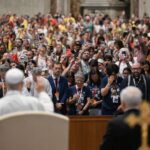Gospel: Mark 9:38-43, 45, 47-48
At that time, John said to Jesus: “Teacher, we saw someone casting out demons in your name, and we tried to stop him because he was not one of us.” Jesus answered: “Do not stop him, for no one who does a miracle in my name can soon afterward speak evil of me. Whoever is not against us is for us. And, moreover, anyone who gives you a cup of water to drink because you belong to Christ, I assure you, will not go unrewarded. Whoever causes one of these little ones who believe in me to stumble, it would be better for him if a millstone were hung around his neck and he were thrown into the sea. If your hand causes you to stumble, cut it off; it is better for you to enter life maimed than with two hands to go into hell, where the fire never goes out. And if your foot causes you to stumble, cut it off; it is better for you to enter life lame than with two feet to be thrown into hell. And if your eye causes you to stumble, gouge it out; it is better for you to enter the kingdom of God with one eye than to be cast into hell with two, where their worm does not die and the fire is not quenched.”
Fruit: Strengthen my decision to say yes to Christ in the small details.
Guidelines for reflection:
Good can be done by everyone, especially by those who live united to God, who allow themselves to be challenged by Him. We must not hinder the good. Let us join together so that charity shines above selfishness in our societies.
1. The zeal of Saint John
The apostles have already completed their first missions; they have gone to preach in some nearby towns, and have even performed some miracles and healings. But for John, and perhaps also for the others, their “apostolic privileges” have gone to their heads: they do not easily accept that others also cast out demons. It is the false zeal that can appear in our hearts: “I am good, and I have this right to preach. What I do is right, and what others do…” Jesus takes the opportunity to continue shaping the hearts of His Twelve: He invites them to see the actions of others with good eyes, to discover the good that others do. Let us examine our inner selves: when I see someone doing a good deed, what is the first thing I think? Do I appreciate it in my heart? Or do I look for the mistake they are making, prejudging their good intentions? Sometimes the evil we see in others only exists in our imagination, in our rigidity to judge others.
2. The two options: for or against
After teaching us what it means to have a good heart, Jesus shows us the radicality of His doctrine: “Whoever is not with me is against me.” There is no middle ground, either for or against. It may seem to us an excessive radicalism, but it reflects our daily life. From the moment we wake up until we go to bed, we are constantly deciding. And often the decision is between two options: either I stay a little longer in bed, feeding laziness, or I get up diligently to make the most of my time. Or I greet my parents kindly or not. Or I put on a good face for the worker who comes to my office or not… This is our life, a continuous decision between good and evil, a yes or a no, charity or selfishness. In another passage of the Gospel, Jesus reminds us: “Let your yes be yes and your no be no; anything more than this comes from the evil one” (Matthew 5:37). That is where the ease and difficulty of our Christian life lie. Let us not worry about how many times we will have to say yes to Christ; just think of the next YES we need to give Him. In the Christian life, as in a hike, what matters is to take the next step well, knowing what our final goal is, and not worrying about how many steps we have to take. Each day’s effort is enough.
Purpose: I will be diligent and decisive in fulfilling my Christian commitments.









